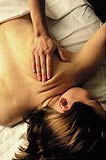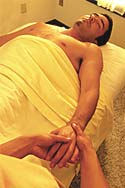|
|
|
|
|
Running
Massage
For Runners
by Claudia Piepenburg - editor of
Road Runner Sports Run Today Newsletter
| |
Therapeutic
massage and sports massage are becoming more popular with runners to reduce
injury and just because they feel great!
|
Physicians are
increasingly prescribing therapeutic massage to complement traditional medical
treatment for illness and injuries. Therapeutic massage involves manipulation
of the soft tissue structures of the body. It soothes, calms and aids in stress
reduction; and it may also improve the rate at which the body recovers from
injury and illness.
Sports massage is often based on Swedish Massage and frequently
includes the use of some of the following techniques:
|
 |
Swedish
Massage
Muscle-specific applications of the standard effleurage,
petrissage and vibration techniques.
Cross-Fiber Massage
A friction technique applied to a specific area to create a stretching and
broadening effect in muscle groups, or on a site-specific muscle and connective
tissue to reduce adhesions.
Trigger Point
Massage
This technique involves positioning specific finger or
thumb pressure on a trigger point in the muscle and connective tissue to reduce
muscle spasms. If left untreated, such trigger points often lead to restricted
and painful movement of body parts.
There are three areas of sports
massage that may be utilized by runners.
Maintenance Massage
An effective training program is based on the regular massage. It's important
that your massage therapist has an understanding of anatomy and kinesiology,
combined with an expert knowledge of which muscles are used in running and
which are likely candidates for trouble. The overall objective of a massage
maintenance program is to help the athlete reach optimal performance through
injury-free training.
Pre-Event Massage
Pre-event massage is used as a
supplement to an athlete's warm-up to enhance circulation and reduce excess
muscle and mental tension prior to competition. It also improves tissue
pliability, readying the athlete for top performance.
Post-Event Massage
Post-event massage is geared toward reducing the muscle spasms and metabolic
build-up that occur with vigorous exercise. Many sports massage techniques
enhance the body's own recovery process, improving the athlete's return to
training and competition, and reducing the risk of injury. |
|
| |
The key to getting a massage is not to wait
until (A) you're injured or (B) you've just run a hard race, like a marathon.
MASSAGE SHOULD BE A REGULAR PART OF YOUR TRAINING SCHEDULE. But why should you
do that in the first place? Here are ten great reasons:
Massage will:
1. Break up scar tissue that may have built up
in your muscles.
2. Improve blood flow to your muscles.
3. Loosen
muscles that have contracted (shortened) with continued use.
4. Allow more
oxygen to move into your muscles.
5. Improve the flow of lymphatic fluid,
which aids in healing.
6. Reduce the chance of injury, through proper
stretching, race preparation and through deep tissue massage.
7. Improve
range of motion and muscle flexibility, resulting in improved power and
performance.
8. Shorten recovery time between workouts.
9. Maximize
the supply of nutrients and oxygen through increased blood flow.
10.
Enhance elimination of lactic-acid build up (a by-product of exercise).
|
|
| |
Are they expensive:
"Sounds like a great idea, but
aren't massages expensive?" you ask. Well, relatively speaking maybe yes, but
when you break it down and compare it to what else you may spend when it comes
to running, you may re-consider. Think about these points:
1.
At an average cost of $75.00 an hour (depending on where you live), a
massage costs about the same as a good pair of running shoes.
2. A winter's worth of running clothing (tights, gloves, Gore-Tex jacket
and a couple of turtlenecks) will cost three or more times the price of one
massage.
3. The price of one massage costs less than the entry
fee to most major marathons (plus the pasta dinner the night before).

When you consider the
benefits of massage, the cost is well worth it. You can have the best shoes
money can buy, but if your hamstring is so tight that you're hobbling when you
run, you might as well be running in flip-flops! And race directors don't
refund entry fees, even if you're too injured to race.
Okay, now
you're convinced! So how do you find the right massage therapist and once
you've found one, how should you prepare? Here's what our running experts
recommend:
You can find a massage therapist via these
sources:
- Talk to other
runners.
- Check with your local running
store.
- Call physical therapists and
chiropractors, sometimes they'll have massage therapists on staff.
- Next time you're at a race, look
for massage therapists at the expo or set-up following the event. Take
advantage of a free ten-minute massage and get their card.
- Many large metropolitan areas
have massage schools. Students are required to work on clients for free as part
of their training. Check with the school to see when free sessions are offered.
If you've never had a massage
before, keep these points in mind:
- Although the experience will be
pleasurable overall, be prepared to feel some soreness. Until you've had
someone massage your feet, you can't appreciate how sore the bottoms of your
feet get!
- Plan a massage on your
off-running day. Your body has been stimulated by the massage, relax and let
yourself enjoy the feeling.
- Don't be afraid to talk to the
therapist. Let him or her know how you're feeling, particularly if the therapy
becomes too uncomfortable. If the massage brings tears to your eyes, it isn't
doing you any good.
- Make sure you're well-hydrated
going into the massage. Take a bottle of water with you and start drinking as
soon as the massage is finished.
|
| |
|
Claudia Piepenburg:
Claudia has been running for twenty years and
is the current editor for Peak Running Performance. She holds or has held state
age-group records in Michigan, North Carolina, Florida, Tennessee and Virginia.
In 1990, she was ranked 18th fastest masters woman in the world and 8th fastest
masters woman in the U.S. in 1990 and 1991. She competed in the 1988 Olympic
Marathon Trials, was 20th woman overall in the 1987 Boston Marathon and women's
winner of the 1986 Virginia Beach Marathon.
Mark Redpath:
Mark is one of the world-class trainers and instructors for Road Runner Sports'
Athletes Helping Athletes program. Originally from Zimbabwe, Mark is an
accomplished triathlete and marathoner.
|
|
|
|
back to
top |
|
|
|
|
|
|
|
|
|
|
|
Search Howtobefit.com
|
TOP SELLING PRODUCTS
Save 15% With Code RICHDBODI15 |
|
|
|